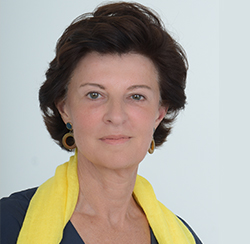
Electra Gizeli
Dept. of Biology, University of Crete and Institute of Molecular Biology and Biotechnology (IMBB), Foundation for Research and Technology-Hellas (FORTH) (gizeli@imbb.forth.gr) Next Generation of Diagnostic Tools for the Point-of-Care exploiting Advancements in Molecular Biology, Biosensors and Nanotechnology During the last 10 years, diagnostics have experienced a huge shift from lab-based testing carried out by trained…
Dept. of Biology, University of Crete and Institute of Molecular Biology and Biotechnology (IMBB), Foundation for Research and Technology-Hellas (FORTH) (gizeli@imbb.forth.gr)
Next Generation of Diagnostic Tools for the Point-of-Care exploiting Advancements in Molecular Biology, Biosensors and Nanotechnology
During the last 10 years, diagnostics have experienced a huge shift from lab-based testing carried out by trained personnel using complex equipment to decentralized, point-of-care solutions, using sensitive and simple methods, performed by non-experts. This shift is the result of advancements made in molecular biology and enzymology, biophysics, and nano/bio-technology. Isothermal amplification methods have become a powerful alternative to the traditional polymerase chain reaction (PCR), generating a high yield of amplicons in just 30 min. Moreover, detection methodologies have been developed exploiting a range of optical, electrochemical, colorimetric, even conformation-sensitive techniques. Still, ongoing challenges include the ability to work with crude samples in the field without increasing the method’s complexity and cost or compromising sensitivity.
In my lab we are working on the development of assays and devices for the rapid amplification and detection of infectious diseases in the field. We are using isothermal amplification methods, namely LAMP and RPA, for the design of sensitive assays for the detection of pathogens including influenza, SARS, Zika, Dengue, and West Nile virus. By optimizing universal reagents and employing bioinformatics-driven primer design, we aim to develop a versatile tool that can be easily adapted for the detection of any emerging threat, thereby enhancing global preparedness for future pandemics. Our strategy is applicable to broad genetic testing including single-cell mutations (sickle cell disease) and transmittable diseases where quantification of the viral load is necessary (HIV). All our assays are coupled to novel detection devices and methodologies including biosensors, colorimetry and nano-particles based fluorescence. Our goal is to create highly sensitive, rapid, and reliable diagnostics that work directly with crude samples, applicable to healthcare, agro/food safety and environmental monitoring.
Dr Electra Gizeli is a Professor in the Dept. of Biology at the Univ. of Crete and Deputy Director at IMBB-FORTH. She received a BSc in Chemistry (National and Kapodistrian Univ. of Athens), MSc in Biotechnology (Univ. College London) and PhD in Biosensors (Univ. of Cambridge). As a BBSRC Fellow, she established her group at the Inst. of Biotechnology, Univ. of Cambridge from five years until 2003 when she joined the Univ. of Crete as a faculty member. Her scientific interests include biosensor/biophysics, molecular diagnostics, nanobiotechnology and biomedical engineering; she has published >90 scientific articles and has 6 patents. The transfer of innovative concepts from the lab to the society has been a constant inspiration in her group, with emphasis on molecular diagnostic tools for healthcare applications. She has co-organized several validation studies in hospitals in Europe and Africa applying novel methods to infectious diseases-testing. Her group has received 4 Innovation awards including the Nokia Open Innovation Challenge in Finland in 2015. She is the co-founder of two spin-off companies dedicated to diagnostic platforms at the point-of-care. During her research career, she has coordinated 33 multidisciplinary research projects after securing competitive funding, most notably from the HFSP and EU, raising in total 32M€ (10M€ for her group). Until today, she has trained 25 post-docs, 15 PhD, and >70 MSc and undergraduate students. She is a Fellow of the Royal Society of Chemistry (FRSC) (2016), member of the European Molecular Biology Organization (EMBO) (2023) and member of the Academia Europaea (2024).
